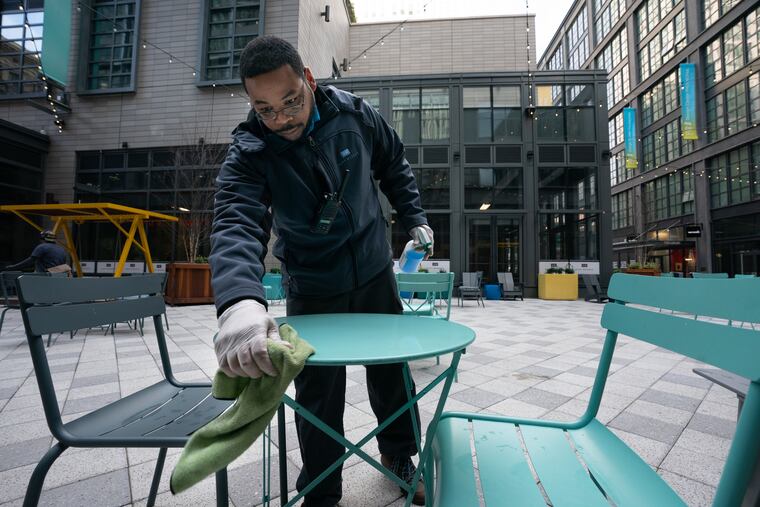The rush to close businesses amid coronavirus reeks of white privilege | Solomon Jones
Shuttering nonessentials businesses was necessary. But those treating the decision as a "no-brainer" exposed their privilege.

As I traversed downtown Philadelphia on Tuesday, I saw shuttered storefronts after Mayor Jim Kenney ordered nonessential businesses to close to prevent the spread of the coronavirus. I don’t disagree with the mayor’s order, and I believe it was necessary. But I also believe that much of the government and media response to this virus has come from a place of white privilege.
In a city where 25% of the population lives in poverty — and where black and brown people are overrepresented in that number — every business owned by a person of color is essential. You don’t need a haircut to live, but to the barber who feeds his family one trim at a time, that business is essential. You can survive without new sneakers, but to the single mother who is a salesperson at a sneaker store, each new pair of kicks is a bottle of milk for her baby. In short, every restaurant, every storefront, every underground example of entrepreneurship is essential to the economic well-being of Philadelphia’s black and brown neighborhoods.
If you’ve never truly been in a position of economic desperation, if you’ve never lived in a community where a dollar is hard to come by, if you’ve never obeyed a societal rulebook that’s structured to put you at a disadvantage, it’s hard to understand how essential a legitimate business truly is.
That’s why even a well-meaning shutdown of businesses by a city government desperate to protect its people from a virus can lead to economic consequences for workers and small-business owners. The mayor understood that when he made the hard decision to shutter nonessential businesses, and he said as much when he announced the closures.
For small-business owners of color, however, a forced closure is especially painful because they start off at a deficit and face extra roadblocks at every turn.
Forbes reported in 2018 that minority-owned small businesses grew about 10 times faster than small businesses did overall, including white-owned ones, between 2007 and 2017. Sounds like success, right? There’s just one problem. Minority-owned firms still can’t get the capital they need to compete on equal footing.
“Minority-owned firms are much less likely to be approved for small business loans than white-owned firms,” Forbes reported. “And, even if they do get approved, minority-owned firms are more likely to receive lower amounts and higher interest rates.”
Fact of the matter is, it’s hard out here for black businesses. While the city has advised workers affected by the closures to apply for unemployment benefits from the state, business owners will need real assistance as well. And they won’t need it in several weeks. They’ll need it now.
» READ MORE: Restaurant and bar owners wrestle with coronavirus dilemma
It’s hard to know that, though, if you are viewing the problem through the lens of white privilege.
This is not to say that the city’s decision to close Philadelphia’s nonessential businesses is racist. It is simply to point out that those who don’t belong to African American communities can’t say what’s essential to them. While white business owners and workers will also be hit by economic losses, our leaders acting like everyone can simply weather the storm and come out whole reflects the very white assumption of a safety net — something black communities don’t have.
But the city isn’t the only entity guilty of crafting the coronavirus response from a position of privilege. My colleagues in the national media have also reported the story from an exceedingly white point of view.
I’ve listened carefully to reports that have focused on those who are working from home to avoid contracting or spreading the coronavirus. But when talking heads proclaim that most of us are telecommuting in response to the virus, who do they mean by “us”?
» READ MORE: As Philly restaurants shutter, massive amounts of food are at risk of going to waste. Here’s how to help.
I doubt that the low-wage workers who come from the North Philadelphia communities where I once lived are telecommuting. In fact, I know they aren’t because I see them in the streets, hurrying to catch buses or subway trains that take them to jobs that don’t pay a living wage.
In all of this, however, there is a silver lining, or perhaps an ominous cloud, depending on one’s point of view.
President Donald Trump, in the midst of an election year, is working on an idea floated by Republican Sen. Mitt Romney. The president wants the government to use taxpayer funds to send at least $1,000 to every American to help us weather the economic hardship connected to the coronavirus outbreak.
Trump manipulating taxpayer dollars for his own political benefit would be the ultimate exercise in white privilege. But in this crisis, it might also be necessary. When others ignore the economic and racial fallout of well-meaning decisions, it might be enough to put Trump back in office in November.